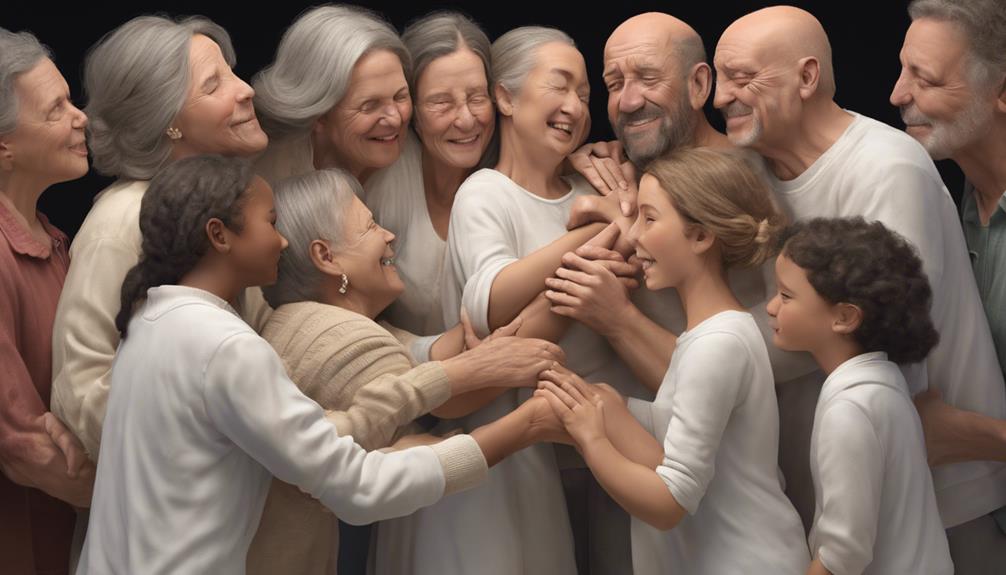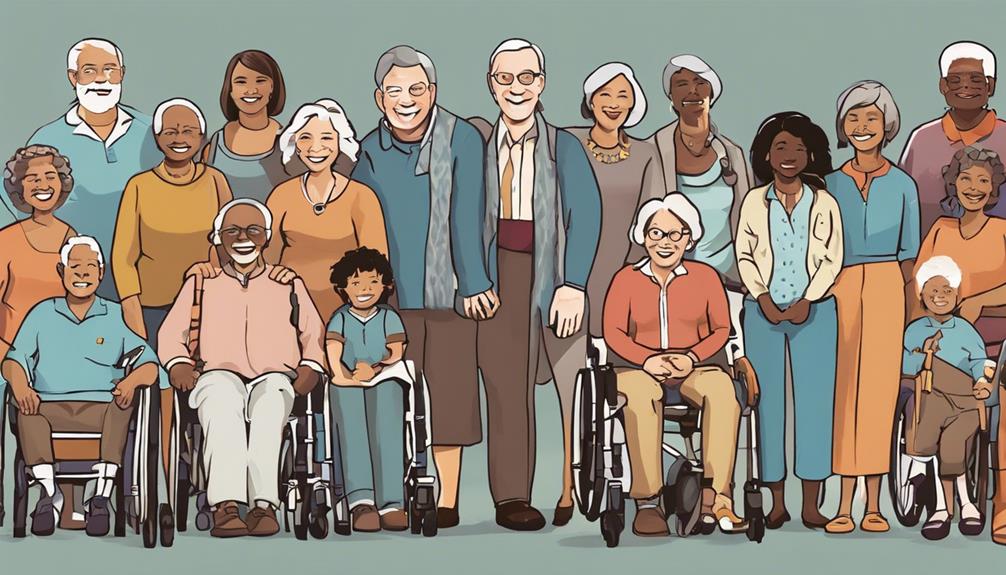Dealing with grief involves acknowledging different stages such as denial and anger. Each individual experiences grief in their own way, and there is no specific timeline for the process. Grief may manifest in physical symptoms like fatigue and emotional reactions such as sadness or guilt. Essential coping strategies include recognizing and expressing emotions, as well as seeking support. It is important to honor the importance of loss and progress towards moving forward. For more information on practical steps to understand grief, delve deeper into comprehension, manifestations, coping mechanisms, and embracing healing and growth.
Key Takeaways
- Acknowledge and accept a range of emotions without judgment.
- Seek support from friends, family, or a grief counselor.
- Prioritize self-care through activities like exercise and meditation.
- Implement practical coping strategies to process feelings.
- Allow for the experience of different emotions to aid in healing.
Understanding the Grieving Process
Understanding the grieving process is vital for navigating the complex emotions and stages that follow a significant loss. Grief is a natural response to loss, and it often involves various stages such as denial, anger, bargaining, depression, and acceptance, as described by Elisabeth Kübler-Ross.
Each individual experiences grief uniquely, and there's no fixed timetable for completing the process. It's essential to acknowledge that children and adults may express grief differently, and the stages of grief may not always occur in a predictable order.
Recognizing Different Manifestations of Grief

Recognizing different manifestations of grief involves understanding the types of grief one may experience. This includes physical reactions like fatigue and aches, as well as emotional responses such as sadness and anger.
Types of Grief
Different types of grief present unique challenges and manifestations, including anticipatory grief, disenfranchised grief, and complicated grief.
Anticipatory grief is felt before an actual loss, often by those expecting the death of a loved one.
Disenfranchised grief occurs when a person's mourning isn't openly recognized, like in cases of pet loss or miscarriages.
Complicated grief involves intense, prolonged symptoms that can disrupt daily life, sometimes necessitating professional help.
Recognizing these specific types of grief can help individuals understand their emotions better and seek appropriate support.
It's essential to acknowledge the differences in how grief can manifest to provide the right kind of assistance to those experiencing it. Remember, offering support and guidance are practical steps in helping others navigate through their grief.
Physical Reactions
Experiencing grief can trigger a range of physical reactions that may include fatigue, changes in appetite, body aches, and lowered immunity. Along with these symptoms, grief can also manifest as nausea, weight changes, and sleep disturbances.
Recognizing these physical expressions is vital for thorough healing and self-care. Understanding that grief affects both the body and mind is essential for managing symptoms effectively.
Coping with physical expressions of grief involves prioritizing self-care practices like proper nutrition, exercise, and rest. By taking care of our bodies during times of grief, we can help alleviate some of the physical burdens that accompany the grieving process.
Emotional Responses
Traversing the emotional landscape of grief involves acknowledging the varied ways in which our feelings can manifest. Grief can evoke shock, sadness, guilt, fear, and anger at different intensities and durations.
These emotional responses may also lead to physical symptoms such as fatigue, nausea, changes in appetite, lowered immunity, and body aches. Individuals dealing with grief may experience emotional numbness, intense waves of sadness, feelings of emptiness, or a sense of disbelief and confusion.
Furthermore, grief can trigger loneliness, anxiety, irritability, difficulty concentrating, and overwhelming emotional pain. Understanding and recognizing these diverse emotional responses is essential for effectively managing the grieving process.
Seeking appropriate support during these challenging times can provide comfort and guidance in handling the complex emotions that accompany grief.
Honoring the Significance of Loss

When we talk about honoring the significance of loss, we're acknowledging the deep emotional pain that comes with it.
It's important to recognize the lasting impact that the person or thing that was lost had on our lives.
Taking steps to commemorate this significance through rituals, traditions, or supporting causes can help us navigate through the process of grieving.
Acknowledging Deep Emotional Pain
Recognizing the profound emotional pain following a significant loss is essential for honoring its significance and embracing the grieving process. It involves allowing oneself to feel the intense grief that accompanies a significant loss, such as the passing of a loved one. By acknowledging this deep emotional pain, individuals can begin to navigate the healing process and move towards acceptance. To emphasize the importance of acknowledging deep emotional pain, consider the following table:
| Key Points | Description | Outcome |
|---|---|---|
| Acknowledging | Recognizing and accepting deep emotional pain | Integration of feelings |
| Allowing feelings | Permitting oneself to feel intense grief | Progress in healing |
| Moving towards acceptance | Embracing the grieving process | Finding peace |
Honoring the significance of loss through acknowledging deep emotional pain is a pivotal step in the journey of grief.
Recognizing Lasting Impact
Reflecting on the lasting impact of a significant loss is essential in integrating the experience into our personal growth journey. When we acknowledge the impact of grief and loss, we take important steps towards healing and moving forward.
Understanding the enduring impact of our emotions can help us navigate through the memories associated with the loss. By recognizing the significance of the loss, we validate the relationship or experience that was so meaningful to us.
This process of acknowledging the impact of loss is vital for our personal growth journey, helping us honor the significance of what we've gone through and guiding us towards healing and acceptance.
Integrating Grief Into Daily Life

To integrate grief into daily life, consider incorporating the memory of your loved one into your everyday routines and activities. By keeping their presence alive in your daily life, you can find solace in memories and honor their legacy. Creating rituals or traditions that pay tribute to the deceased, like lighting a candle, visiting a special place, or sharing stories, can help you feel connected to them. Reminders such as photos, keepsakes, or journals can serve as touchstones to maintain your connection with the person you've lost. Seeking support from friends, family, or support groups is essential in assimilating the integration of grief into your daily life. Remember to allow yourself to experience a range of emotions as you go about your routines, understanding that grief is a natural part of healing and coping.
| Ideas for Integrating Grief Into Daily Life | ||
|---|---|---|
| Incorporate memory into daily routines | Create rituals or traditions to honor the deceased | Utilize reminders like photos or keepsakes |
Seeking Support From Loved Ones

Incorporating grief into our daily lives can be made more manageable by seeking support from loved ones during the grieving process. When going through a tough time, having a strong support system can make all the difference. Here are some ways your loved ones can provide the help you need:
- Offering Emotional Support: Loved ones can provide a listening ear, empathy, and understanding to help you navigate through your grief. Expressing your feelings to them can offer comfort and emotional relief.
- Assisting with Daily Tasks: Family and friends can lend a helping hand with daily chores, provide companionship, and offer practical support. These gestures can ease your burden and allow you to focus on coping with your loss.
- Creating a Support Network: Building a support network of caring individuals can help you feel less isolated and more connected. It offers a sense of community, belonging, and understanding, which are critical for coping with grief.
Consulting Mental Health Professionals

When moving through the grieving process, reaching out to mental health professionals can provide tailored support and strategies to help cope with complex emotions and challenges. Consulting mental health professionals such as psychologists, therapists, and grief counselors can offer personalized strategies and interventions to assist in maneuvering the stages of grief.
These professionals create a safe space for individuals to express their feelings, process their grief, and develop coping mechanisms suited to their unique needs. By seeking help from mental health professionals, one can gain insights into managing symptoms, fostering healing, and understanding the journey towards acceptance and healing after a loss.
These professionals play an essential role in providing guidance, support, and tools for coping with grief. Their expertise can be instrumental in offering the necessary support to navigate through the difficult emotions and challenges that arise during the grieving process.
Coping Strategies for Grief

Traversing the complex emotions of grief involves implementing practical coping strategies that can help individuals process their feelings and find ways to heal and move forward. During this challenging time, it's essential to utilize various techniques to navigate through emotional pain.
- Acknowledge Your Emotions: Allow yourself to feel and express your emotions. It's okay to grieve and experience the range of feelings that come with loss.
- Seek Support: Reach out to friends, family, or a grief counselor. Talking about your feelings and receiving support can help you cope with grief.
- Prioritize Self-Care: Take care of your physical health by getting enough rest, eating well, and engaging in self-care activities like exercise or meditation. Self-care is vital in managing grief and promoting healing.
Importance of Self-Care Practices

When grieving, it's important to prioritize self-care practices to help us heal and cope with our loss. Engaging in routines, getting enough sleep, and staying physically active can boost our mood and energy levels during this challenging time.
Mindfulness and relaxation techniques, along with proper nutrition, play essential roles in supporting our emotional and physical well-being as we navigate through grief.
Self-Care for Healing
Engaging in regular self-care practices is essential for promoting healing and overall well-being during the grieving process. Here are three key self-care activities to aid in your journey of grief navigation:
- Healthy Eating: Consuming nutritious foods fuels your body and mind, enhancing resilience and mental health.
- Exercise: Physical activity releases endorphins, boosting mood and reducing stress, essential for emotional regulation.
- Mindfulness: Practicing mindfulness techniques, like deep breathing or meditation, fosters relaxation and coping abilities in challenging times.
Coping With Loss
Prioritizing self-care practices is essential for individuals coping with loss, aiding in maintaining their physical and emotional well-being during the grieving process. Engaging in self-care activities like mindfulness, relaxation techniques, and physical exercises can greatly improve mood, reduce stress, and support overall mental health. These practices play an important role in promoting healing, resilience, and emotional stability amidst the challenges of grief. Taking time for self-care allows moments of respite, comfort, and rejuvenation during the emotional turmoil of loss. Here's a table highlighting various self-care practices that can help individuals cope with grief:
| Self-Care Practice | Benefits |
|---|---|
| Mindfulness | Reduces stress, enhances emotional well-being |
| Relaxation Techniques | Calms the mind, promotes relaxation |
| Physical Activities | Improves mood, boosts physical health |
| Healthy Eating | Provides energy, supports overall well-being |
Moving Forward After Loss

After experiencing a significant loss, integrating it into our lives while honoring its significance is essential for moving forward. It's normal to feel intense emotions about a loss as part of the grieving process, even years later.
Here are three practical steps to help navigate moving forward after loss:
- Honoring the memory: Find ways to commemorate the life of the one we lost, such as creating a memory book or dedicating a special day to them. This can help keep their memory alive while also providing comfort in the grieving process.
- Finding ways to live: Explore new hobbies, volunteer work, or support groups to help fill the void left by the loss. Engaging in activities that bring joy and purpose can aid in the healing process and provide a sense of moving forward.
- Embracing growth: Understand that while the loss shapes us, it doesn't define us. Allow yourself to grow from the experience, finding strength and resilience in the face of adversity. This growth can lead to healing and a renewed sense of purpose in life.
Embracing Healing and Growth

Healing and growth through grief involve accepting the reality of loss and allowing ourselves to experience a range of emotions without judgment. By finding meaning in our pain, learning to live with the absence, and integrating the experience into our lives, we can gradually adjust to a new normal. Seeking support from others and engaging in self-care practices are crucial steps in this journey of healing. It's important to acknowledge the pain of grief while recognizing the potential for personal transformation and positive change.
| Key Steps | Description | Importance |
|---|---|---|
| Accepting loss | Acknowledge the reality of the loss without denying it to begin the healing process. | Fundamental step |
| Experiencing emotions | Allow yourself to feel a range of emotions, from sadness to anger, without judging or suppressing them. | Promotes emotional well-being |
| Seeking support | Connect with friends, family, or a therapist to share your feelings and receive comfort and guidance. | Provides emotional assistance |
| Self-care practices | Engage in activities that nurture your physical, emotional, and mental well-being, such as exercise or journaling. | Promotes overall wellness |
| Adjusting to new normal | Gradually adapt to a life without your loved one, finding ways to honor their memory while moving forward. | Facilitates the healing process |
Frequently Asked Questions
What Are the 3 C's of Grief?
We grasp the 3 C's of grief: 'cause,' 'control,' and 'cure.' They assist us in recognizing triggers, handling responses, and embracing healing gradually. By acknowledging these facets, we can navigate the intricacies of grief with compassion and resilience.
What Is One of the Best Ways to Effectively Deal With Grief?
Acknowledging our emotions fully is essential in dealing with grief. It's okay to feel all the ups and downs. Mindfulness practices help us process emotions. Talking to someone we trust and journaling are important too.
What Not to Do When Grieving?
When grieving, we should avoid suppressing emotions, isolating ourselves completely, rushing the process, making major decisions impulsively, and comparing our grief to others. Each journey is unique; seeking support and giving ourselves time is essential.
What Are the 5 Stages a Person Must Move Through in Regards to Coping With Loss and the Grieving Process?
We believe in acknowledging the 5 stages of grief: denial, anger, bargaining, depression, and acceptance. These stages vary for each person and may not follow a specific order. Understanding them helps navigate the emotional journey of loss. Grief is a deeply personal process, and everyone experiences it in their own unique way. Among these stages, bargaining explained in grief stages highlights the attempt to regain a sense of control or come to terms with the loss through “if only” scenarios. By recognizing these phases, we can foster compassion for ourselves and others as we move toward healing.
Conclusion
To sum up, it's important to remember that grief is a natural and necessary process. By recognizing the different manifestations of grief, honoring the significance of loss, seeking support from loved ones, and practicing coping strategies and self-care, we can navigate through our grief in a healthy way.
Moving forward after loss may be challenging, but embracing healing and growth can lead to a sense of peace and resilience in the face of adversity.









